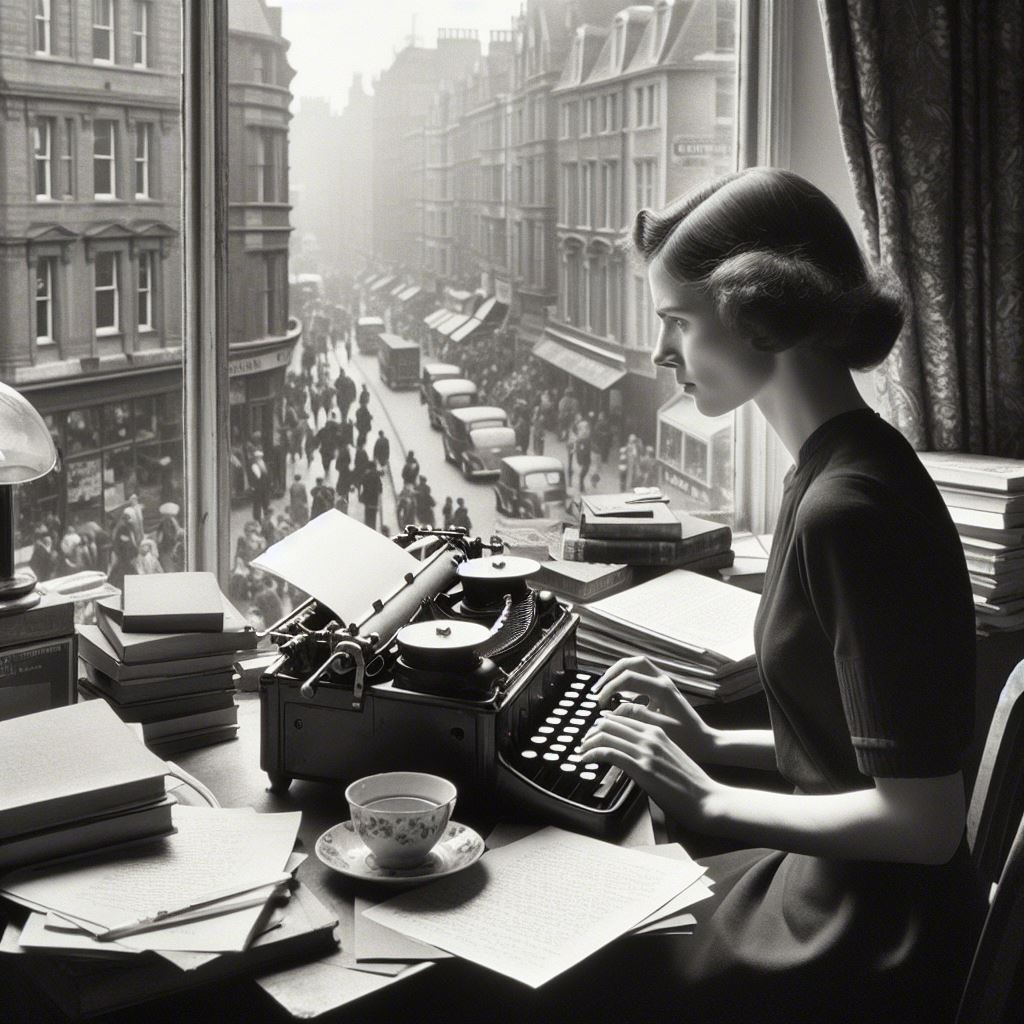Introduction
Historical fiction writing is a popular genre in the UK, appealing to both readers and writers.
This genre brings history to life through storytelling.
Historical fiction captures the essence of a specific time period, immersing readers in the past.
Writers are able to explore historical events, characters, and settings, creating a rich and vivid tapestry.
The appeal of historical fiction lies in its ability to transport readers to a different era, allowing them to experience history firsthand.
Additionally, historical fiction provides a unique opportunity for writers to blend fact and fiction, seamlessly merging real historical events with their own imaginative narratives.
This genre allows for creative freedom while still grounding the story in a historical context.
Through the use of meticulous research, writers can construct authentic and believable worlds from the past.
Whether it’s the intrigue of Tudor England, the drama of World War II, or the glamour of the Roaring Twenties, historical fiction offers a wide range of settings and time periods to explore.
It allows readers to learn about history while being entertained by a compelling story.
In the UK, historical fiction continues to captivate audiences and provide a means of understanding the past in a unique and engaging way.
History of Historical Fiction Writing in the UK
Historical fiction writing in the UK has a rich and fascinating history that spans centuries.
From its origins to its current popularity, this genre has captivated readers and allowed them to step into the past.
Origins of Historical Fiction in the UK
The roots of historical fiction can be traced back to ancient times, when storytellers wove tales of legendary heroes and mythical events.
In the UK, historical fiction took shape during the medieval period, with the Arthurian legends and tales of chivalry and adventure.
Personalized UK Career Consulting
Receive tailored career guidance designed just for you. Get actionable steps and expert support to boost your career in 1-3 days. Take control of your career now.
Get StartedDuring the Renaissance, historical fiction became a means of exploring political and social issues, as seen in works like Sir Thomas More’s “Utopia.”
However, it was not until the 18th century that the genre truly began to flourish, with the rise of the historical novel.
Prominent Historical Fiction Authors from the Past
- Sir Walter Scott was one of the earliest and most influential historical fiction authors, known for his novels such as “Ivanhoe” and “Waverley.”
- Charles Dickens also wrote historical fiction, incorporating social commentary into works like “A Tale of Two Cities” and “Barnaby Rudge.”
- Other notable authors include Jane Austen with “Pride and Prejudice” and Emily Brontë with “Wuthering Heights.”
- The 20th century saw the emergence of authors like Hilary Mantel, who brought historical figures like Thomas Cromwell to life in her novels.
Development and Popularity of the Genre over Time
- Historical fiction gained widespread popularity in the UK during the Victorian era, as readers sought to escape the realities of industrialization.
- As the genre evolved, authors began incorporating more accurate historical research and focusing on different time periods and cultures.
- The popularity of historical fiction continues to thrive today, with authors like Philippa Gregory and Bernard Cornwell entertaining readers with their immersive narratives.
- Historical fiction has also found success in other mediums, including film adaptations of classic novels and television series like “Downton Abbey.”
The appeal of historical fiction lies in its ability to transport readers to different eras, providing a glimpse into the lives of people who lived in the past.
By blending fact and fiction, authors create a vivid and engaging tapestry that brings history to life.
From its humble origins to its current prominence, historical fiction writing in the UK has evolved and thrived.
With a rich tapestry of authors and stories, this genre continues to captivate readers and offer them a window into the past.
Read: Freelance Journalism in the UK: A Guide
Key Themes in UK Historical Fiction
Historical fiction set in the UK often explores common themes that are shaped by historical events and cultural aspects.
These themes not only provide a deeper understanding of the past but also resonate with contemporary readers.
Common themes found in historical fiction set in the UK
Let’s dive into some of these key themes:
Love and Romance
Love and romance are popular themes in UK historical fiction.
They often depict passionate relationships and explore how societal norms and expectations impact love.
War and Conflict
Many historical novels set in the UK revolve around wars and conflicts.
They explore the horrors of war while shedding light on the bravery and sacrifices of individuals.
Your Dream Job Starts with a Perfect CV
Get a tailored CV and cover letter that captures your unique strengths and stands out in your industry. Let us help you make an unforgettable first impression.
Get StartedSocial Class and Inequality
The rigid social class system in the UK has been a prominent theme in historical fiction.
These novels delve into the lives of both the privileged and the disadvantaged, highlighting the stark societal divisions.
Identity and Coming of Age
Identity formation and coming-of-age stories are commonly found in UK historical fiction.
These narratives follow individuals as they navigate societal expectations and discover their true selves.
Power and Politics
Power struggles and political intrigue feature prominently in UK historical novels.
They explore the machinations of monarchs, politicians, and revolutionaries, providing insight into the dynamics of governance.
What historical events and cultural aspects shape these themes
Historical events and cultural aspects play a significant role in shaping these themes. For instance:
The Tudor Era
The Tudor era is a popular setting for UK historical fiction.
Authors often center their stories around the reigns of Henry VIII and Elizabeth I, exploring themes of power, politics, and religious strife.
The World Wars
Both World War I and II have had a profound impact on the UK, and historical fiction set during these periods reflects the experiences of individuals affected by war and the societal changes that followed.
The Industrial Revolution
The Industrial Revolution’s impact on society, economy, and class divisions is a recurring theme in UK historical fiction.
These novels shed light on the harsh living conditions and exploitation of workers during this transformative period.
The British Empire
The legacy of the British Empire is often explored in historical fiction, delving into the lives of both colonizers and the colonized across different regions and times, prompting reflections on power dynamics and cultural clashes.
Examples of key themes in popular UK historical novels
There are numerous examples of popular UK historical novels that effectively encapsulate these themes:
Optimize Your LinkedIn for Success
Boost your LinkedIn profile with a professional bio, keyword-rich headline, and strategic recommendations that attract recruiters. Stand out from the crowd and get noticed.
Optimize Now“Wolf Hall” by Hilary Mantel
This award-winning novel brings the Tudor era to life, delving into the political intrigues and complexities of Thomas Cromwell’s rise to power.
“Birdsong” by Sebastian Faulks
Set during World War I, this novel follows protagonist Stephen Wraysford as he experiences the horrors of trench warfare while also exploring themes of love and loss.
“Pride and Prejudice” by Jane Austen
Though a classic, these novel addresses social class, love, and the constraints placed upon women in 19th-century England.
“The Far Pavilions” by M.M. Kaye
This sweeping epic takes readers to 19th-century India, combining love, adventure, and the clash of cultures against the backdrop of British imperialism.
In essence, UK historical fiction encompasses a wide range of themes that are shaped by historical events and cultural aspects.
These themes provide readers with insights into the past while exploring universal experiences that continue to resonate today.
Read: Women in UK Journalism: Challenges & Wins
Research and Authenticity in UK Historical Fiction
The importance of research in writing historical fiction
Research is crucial in writing historical fiction as it ensures accuracy and helps bring the past to life.
Resources and methods used by UK authors for accurate portrayal
Authors in the UK utilize various resources and methods to achieve an accurate portrayal of historical events.
Primary sources like diaries, letters, and official records offer firsthand accounts and valuable insights.
Secondary sources such as academic books, papers, and documentaries provide in-depth analysis and historical context.
Visiting museums, historical sites, and archives allows authors to immerse themselves in the period they are writing about.
Photographs, paintings, and illustrations help visualize the setting, clothing, and objects of the time period.
Online databases and digital archives enable authors to access a vast range of historical materials conveniently.
Engaging with historians, scholars, and experts in the field ensures accuracy and provides valuable feedback.
Discussing the topic with local historians or individuals with personal connections to the era adds depth and authenticity.
Listening to oral histories or interviews with people who have experienced the time period firsthand provides unique perspectives.
The significance of authenticity in captivating readers
Authenticity is crucial in captivating readers and making them feel fully immersed in the historical setting.
Readers appreciate the attention to detail and the sense of believability that comes with an authentic portrayal.
Historical accuracy enhances the credibility of the story and builds trust between the author and the reader.
Authentic characters who reflect the attitudes, customs, and language of the time period add depth to the narrative.
Exploring social norms, cultural practices, and political climate of the era adds richness and complexity to the story.
Avoiding anachronisms and ensuring that dialogue and behavior align with the time period helps maintain authenticity.
Authenticity creates a sense of escapism, allowing readers to travel back in time and experience different worlds.
Authors strive to strike a balance between historical accuracy and storytelling, maintaining interest while being true to the period.
Read: UK Writing Competitions: What to Enter

Notable UK Historical Fiction Authors
Historical fiction is a genre that combines elements of both history and fiction, allowing readers to immerse themselves in worlds from the past.
The UK has produced many talented authors who have made significant contributions to this genre.
In this section, we will showcase some of the influential UK authors known for their historical fiction works.
Influential UK authors known for their historical fiction works
Hilary Mantel
Hilary Mantel is a highly acclaimed British author known for her historical novels set in the Tudor period.
Her most notable works include “Wolf Hall” and “Bring Up the Bodies,” both of which won the prestigious Man Booker Prize.
Mantel’s meticulous research and compelling storytelling have made her a favorite among readers.
Philippa Gregory
Philippa Gregory is a bestselling author whose works often focus on the lives of women during pivotal moments in history.
She is known for her novels such as “The Other Boleyn Girl,” “The White Queen,” and “The Red Queen.”
Gregory’s vivid characters and detailed historical settings make her books captivating reads.
Bernard Cornwell
Bernard Cornwell is a prolific author known for his mastery of historical battles and military fiction.
His most famous series, “The Last Kingdom,” follows the adventures of Uhtred of Bebbanburg during the Viking Age.
Cornwell’s meticulous attention to detail and gripping action sequences have earned him a loyal fanbase.
Sarah Waters
Sarah Waters is a British author who often combines elements of historical fiction with LGBTQ+ themes.
Her novels, such as “Tipping the Velvet” and “Fingersmith,” are set in the Victorian era and explore the lives of queer individuals in repressive societies.
Waters’ writing is both evocative and thought-provoking.
Ken Follett
Ken Follett is a beloved author known for his epic historical novels, which often span multiple generations and encompass significant historical events.
His best-known work, “The Pillars of the Earth,” is set in medieval England and intricately weaves together the lives of various characters.
Follett’s books are known for their rich historical detail and captivating storytelling.
C.J. Sansom
C.J. Sansom is a British author who writes gripping historical crime novels.
His most famous series features the hunchbacked lawyer Matthew Shardlake and is set during the reign of Henry VIII.
Sansom’s books, including “Dissolution” and “Dark Fire,” offer a unique blend of historical accuracy and thrilling mysteries.
Kate Mosse
Kate Mosse is known for her historical novels with strong female protagonists.
Her blockbuster novel, “Labyrinth,” intertwines the stories of two women from different time periods, connected by the mystery surrounding the Holy Grail.
Mosse’s books are often filled with adventure, mystery, and rich historical detail.
Tracy Chevalier
Tracy Chevalier is a British-American author known for her historical fiction novels that focus on the lives of ordinary people amidst historical events.
Her novel “Girl with a Pearl Earring” is set in 17th-century Delft during the Dutch Golden Age and offers a fictional account of the creation of Johannes Vermeer’s famous painting.
These notable UK authors represent a diverse range of historical fiction, catering to different reader preferences.
Whether you prefer Tudor intrigue, medieval battles, or stories of ordinary people in extraordinary times, there is a UK historical fiction author for everyone.
So, grab a book and transport yourself to the past!
Read: Art Therapy: The UK Perspective & Practice
Challenges and Opportunities in Writing UK Historical Fiction
The challenges faced by authors in this genre
- Researching and ensuring historical accuracy can be a major challenge for authors in this genre.
- Creating a compelling narrative while staying true to historical facts requires a delicate balance.
- Authenticity is vital, and authors need to immerse themselves in the time period they are writing about.
- Constructing believable and relatable characters within the context of the historical setting can be demanding.
- Developing a unique story amidst the vast number of historical fiction novels is a constant challenge.
- Choosing the right time period and setting can greatly impact the success of a historical fiction book.
Opportunities for Writers in UK Historical Fiction
- The demand for historical fiction remains strong, attracting a wide readership seeking captivating stories.
- UK historical fiction offers diverse settings, spanning from medieval times to the Victorian era.
- Exploring different historical events and figures allows writers to educate and entertain readers simultaneously.
- Collaboration with historians and experts can provide valuable insights and enhance the authenticity of the narrative.
- Adaptation opportunities exist, with successful historical fiction novels often being turned into movies or TV series.
- The UK’s rich history provides an abundance of fascinating stories waiting to be discovered and shared through writing.
Advice and Tips for Aspiring Historical Fiction Writers
- Immerse yourself in the historical period you intend to write about, conducting thorough research.
- Strive for accuracy but remember that you are still crafting a work of fiction.
- Create complex and relatable characters that resonate with readers and fit within the historical context.
- Balance historical detail with engaging storytelling to keep readers entertained while educating them.
- Join writing groups or workshops focused on historical fiction to gain insights and feedback from fellow writers.
- Read extensively within the genre to understand different approaches, styles, and successful storytelling techniques.
- Develop a strong writing routine and discipline to ensure consistent progress in your historical fiction project.
Writing historical fiction in the UK can be both challenging and rewarding.
Authors need to navigate the complexities of historical accuracy while capturing readers’ imaginations with compelling narratives.
The genre offers a range of opportunities, from diverse settings to potential adaptations.
Aspiring writers should embrace research, balance fact and fiction, and invest in developing relatable characters.
By doing so, they can create captivating stories that transport readers to different periods of history and leave a lasting impact.
Conclusion
Historical fiction writing in the UK holds immense significance and popularity.
This genre plays a crucial role in preserving and interpreting history for readers.
By immersing themselves in these stories, readers are able to gain a deeper understanding of past events and their impact on our present.
It is essential to support local authors and explore their works of UK historical fiction.
Through these narratives, we can uncover hidden stories, forgotten heroes, and untold perspectives.
This not only enriches our knowledge of history but also encourages a sense of cultural appreciation and identity.
By reading and engaging with UK historical fiction, we contribute to the preservation of our heritage and keep the spirit of the past alive.
Let us delve into the pages of these novels, unravel the mysteries of bygone eras, and celebrate the artistry and dedication of the writers who bring history to life.
[E-Book for Sale]
500 Cutting-Edge Tech Startup Ideas for 2024 & 2025: Innovate, Create, Dominate
$19.99 • 500 Tech Startup Ideas • 62 pages
You will get inspired with 500 innovative tech startup ideas for 2024 and 2025, complete with concise descriptions to help you kickstart your entrepreneurial journey in AI, Blockchain, IoT, Fintech, and AR/VR.




